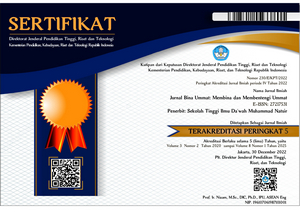DEVELOPMENT OF A FAIR WAGE SYSTEM TO IMPROVE WORKERS' WALFARE FROM AN ISLAMIC ECONOMIC PERSPECTIVE
DOI:
https://doi.org/10.38214/jurnalbinaummatstidnatsir.v7i2.296Abstract
Islam views the issue of wages as having a lot to do with moral concepts, while the West does not. Even wages in Islam are not only limited to material (material or worldly) but to penetrate the boundaries of life, namely the dimension of the hereafter called merit, while the West does not. The implementation of the Western version of the wage system, which is currently still ongoing, is at least the background for the occurrence of unequal social and welfare disparities. The polemic of workers' wages has always been an endless discussion. Even though there is still something worse than the wages of workers, namely the wages of teachers and lecturers of small private foundations. Moreover, the school and campus are Islamic foundations. This paper is expected to provide a view on how the wage system should be implemented in accordance with the postulates of the Qur'an and Sunnah. This study uses a qualitative approach with secondary data. Then it was analyzed using content analysis. The results of the study show that the concept of wages in the Islamic view is the reward that a person receives for his work in the form of rewards in the world in a fair and polite manner and in the form of rewards in the hereafter because work has a dimension of worship. The principle must be based on voluntary agreement without coercion from both parties. A wage contract is valid with the existence of rights and obligations between the two, clearly stating the wage level, contract period, type, and nature of the work. The determination of wages in Islam must also be determined by the interaction of market forces on the supply and demand of labor, taking into account the aspects of justice and respect. In addition, the government also needs to set a minimum wage price if the market mechanism is unable to realize fair and decent wages for workers. It is also recommended that the minimum wage in Islam is determined based on the nishab zakat.
Keywords: Wage, Salary, Labour, Teachers and Lecturers, Welfare.
Published
Versions
- 2025-01-01 (3)
- 2024-12-31 (2)
- 2024-12-31 (1)
Issue
Section
This work is licensed under a Lisensi Creative Commons Atribusi 4.0 Internasional.
Authors who publish with this journal agree to the following terms:
- Authors retain copyright and grant the journal right of first publication with the work simultaneously licensed under a Creative Commons Attribution License that allows others to share the work with an acknowledgment of the work's authorship and initial publication in this journal.
- Authors are able to enter into separate, additional contractual arrangements for the non-exclusive distribution of the journal's published version of the work (e.g., post it to an institutional repository or publish it in a book), with an acknowledgment of its initial publication in this journal.
- Authors are permitted and encouraged to post their work online (e.g., in institutional repositories or on their website) prior to and during the submission process, as it can lead to productive exchanges, as well as earlier and greater citation of published work (See The Effect of Open Access).




